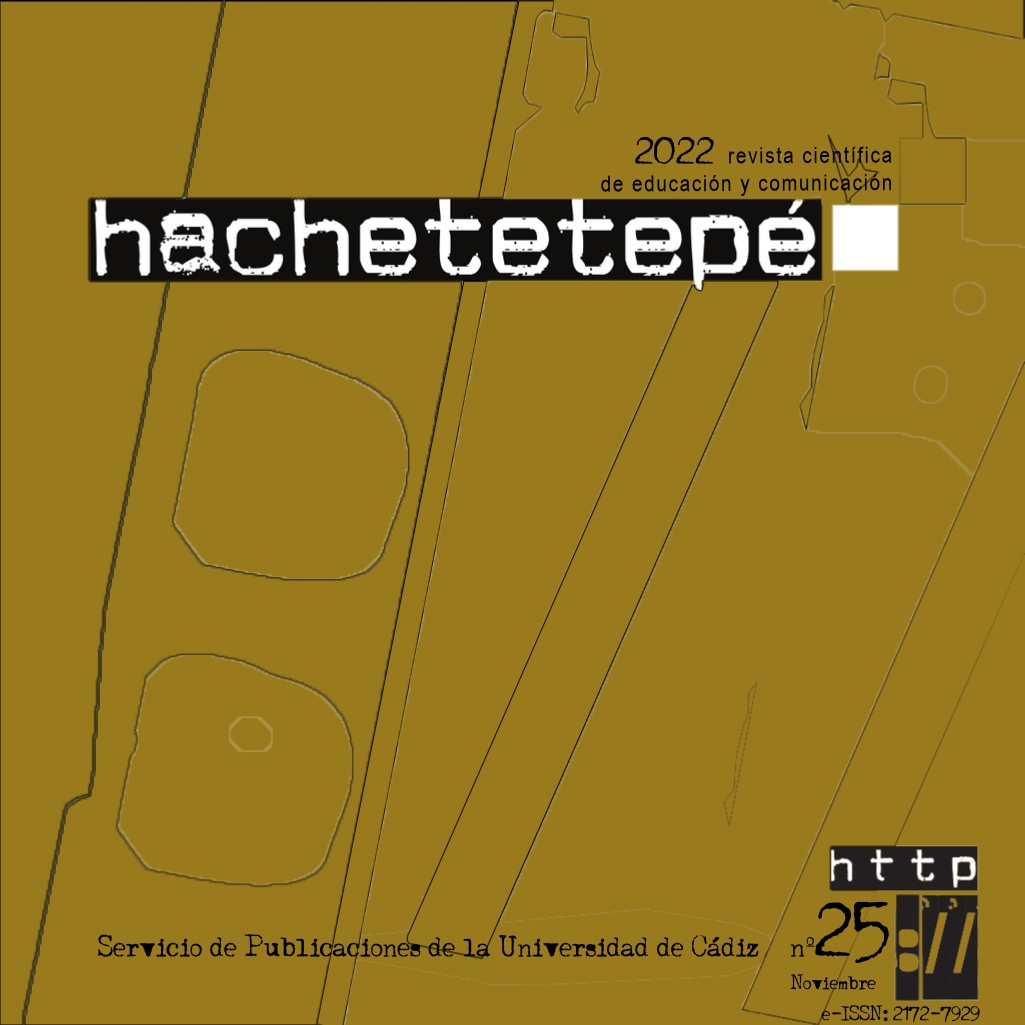Care through storytelling: teaching craft in the brazilian basic education during the Covid-19 pandemic

Downloads
- PDF (Português (Brasil)) 214
- EPUB (Português (Brasil)) 57
- VISOR (Português (Brasil))
- MÓVIL (Português (Brasil))
- XML (Português (Brasil)) 16
DOI
https://doi.org/10.25267/Hachetetepe.2022.i25.2201Info
Abstract
This article presents an excerpt from the research “Narratives of the teaching work during the Covid-19 pandemic: practices of care in education through craft’s memory”, developed with Basic Education teachers in the Brazilian public education system. The experience of teaching work in the context of the Covid-19 pandemic is analyzed, accessed through narratives of teachers, taking a clinical point of view of work, that is, in the articulation of subjectivity, health and work. The research, understood as intervention-research, uses an online platform where participating teachers submit narratives about teaching work during the pandemic, as well as interact with other narratives. Conversation circles are also held among the research participants through online meeting platforms. We found the teaching craft under shock - in a great effort not to succumb to the challenges posed by the pandemic in the Brazilian reality - and a classroom in a movement of reterritorialization from the technological encounters that confinement demanded. The narrative production process is a tool for weaving a collective dimension of narrativity, thus composing a care strategy for the teaching craft, as well as for the people who exercise it.Keywords
Downloads
Supporting Agencies
How to Cite
License
Copyright (c) 2022 Fernanda Spanier Amador, Juliana Prediger, Daniel Rodrigues Fernandes, Aline Talita Rosa Santos

This work is licensed under a Creative Commons Attribution-NonCommercial-NoDerivatives 4.0 International License.
Those authors who have published with this journal, accept the following terms:
- They will retain their copyright and guarantee the journal the right to first publication of their work, which will simultaneously be subject to the Creative Commons Attribution License . They may be copied, used, disseminated, transmitted and publicly displayed, provided that the authorship, url, and magazine are cited, and are not used for commercial purposes. No derivative works are allowed.
- They may adopt other non-exclusive license agreements for the distribution of the published version of the work (e.g., deposit it in an institutional telematic archive or publish it in a monographic volume) provided that the initial publication in this journal is indicated.
- Disseminate your work through the Internet (e.g., in institutional telematic archives or on your website) once the manuscript is accepted, which may lead to interesting exchanges and increased citations of the published work. (See The effect of open access).
Hachetetepé. Scientific journal of education and communication does not charge a fee for the submission of manuscripts or for the publication of its articles.
References
Amador, F., e Fonseca, T. M. G. (2011). Atividade: o trabalho sob o signo do inacabamento. En D.S. Rosemberg, J. Ronchi Filho e M.E.B. Barros (Orgs) Trabalho docente e poder de agir: clínica da atividade, devires e análises (1ªed. pp. 19-50). EDUFES.
Canguilhem, G. (2001). Meio e normas do homem no trabalho. Pro-posições, 12(2-3), 109-121. https://bit.ly/3NCNkvD
César, J. M., Luciano, L. Dos S., Carvalho, P. H., e Almeida, U. R. (2016). A devolutiva como exercício ético-político. En F.H. Silva, J.M. César, M.E.B. Barros, M. E. B, Saúde e Trabalho em educação: desafios do pesquisar (1ªed. pp. 175-200). EDUFES.
Clot, Y. (1985) Le travail sans l’homme? La Découverte.
Clot, Y. (2006). A Função Psicológica do Trabalho. Vozes.
Clot, Y. (2010). Trabalho e poder de agir. Fabrefactum.
Clot, Y. (2013). O ofício como operador de saúde. Cadernos de Psicologia Social do Trabalho, 16(spe1), 1-11. https://bit.ly/3aPnbLq
Ferreira, L. G., Ferraz, R. D., e Ferraz, R. D. C. S. N. (2021). Trabalho docente na pandemia: discursos de professores sobre o ofício. Fólio-Revista de Letras, 13(1), 323-344. https://doi.org/10.22481/folio.v13i1.9070
Gagnebin, J. M. (2006). Lembrar escrever esquecer (Vol.34). Editora 34.
Gatti, B. A. (2020). Possível reconfiguração dos modelos educacionais pós-pandemia. Estudos Avançados, 34, 29-41. https://doi.org/10.1590/s0103-4014.2020.34100.003
Haraway, D. J. (2016). Staying with the Trouble. Duke University Press.
Lhuilier, D. (2006). Cliniques du travail. Paris.
Schwartz, Y. (2007). Uso de si e competência. En Y. Schwartz e L. Durrive (Orgs.). Conversas sobre a atividade humana (1ªed, pp.205-221). Eduff.
Schwartz, Y. (2011). Manifesto por um ergoengajamento. En P.F Bendassolli e L.A.P. Soboll, (orgs). Clínicas do trabalho: novas perspectivas para compreensão do trabalho na atualidade., (1ªed. pp.132-166). Atlas.






